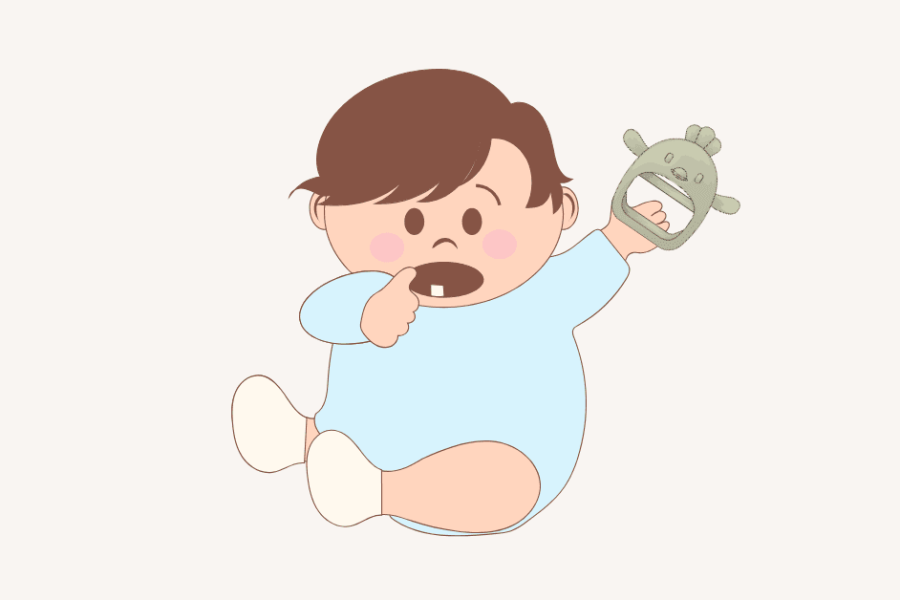When gathering with fellow parents or caregivers, conversations often gravitate towards common baby topics such as sleep patterns, regressions, teething, developmental milestones, food intolerances, and feeding. In this discussion, we’ll focus on teething and how it affects your baby’s sleep.
It’s not uncommon for parents to attribute their baby’s nighttime waking to teething, especially during extended episodes. While teething can certainly be challenging, it’s important to explore the facts surrounding this developmental stage.
Is teething really painful?
When babies are born, their teeth have yet to emerge and rest beneath the gums. These primary, or “milk” teeth, begin to erupt at various stages of growth, typically starting around 6 months, but this can vary. The process usually begins with the front incisors emerging from the lower gums, followed by the upper ones. As the teeth break through the gums, they can cause localized inflammation and changes in the soft tissue, leading to swollen gums and tenderness. However, once the tooth fully emerges, the pain generally subsides.
While teething can indeed cause discomfort, with some babies experiencing swollen, tender gums that lead to irritability, it is reassuring to know that this is temporary. The discomfort tends to occur in short bursts rather than extending over weeks or months. According to the American Academy of Paediatrics, teething may cause mild discomfort, but it is typically not severe enough to significantly disrupt a baby’s overall well-being or sleep patterns.

How long does teething last?
As mentioned earlier, a baby doesn’t get all their teeth at once. Teething typically begins around 6 months and can continue until age 3, when all 20 teeth have emerged. It’s a gradual process, not one that produces all the pain at once. According to the American Academy of Paediatrics, “symptoms were only significantly more frequent in the 4 days before a tooth emergence, the day of the emergence, and 3 days after it, so this 8-day window was defined as the teething period.”
If you decide to postpone a regular sleep training schedule until your child has finished teething, you might end up waiting for a few years. Keep in mind that other developments, like achieving new milestones or experiencing growth spurts, can also occur during this period. Therefore, it’s crucial not to let teething become a reason to put off starting sleep training.
Is Teething Responsible for Keeping Babies Up at Night?
It’s important to remember that each baby reacts differently to teething. Most babies experience mild symptoms, while some may become a bit more restless at night, waking more often and possibly developing a low-grade fever.
Even though teething might cause a few disrupted nights, it’s usually not the reason for babies waking multiple times over weeks or months. Often, frequent nighttime awakenings are due to babies developing sleep associations or inconsistent sleep routines.
By prioritizing sleep training and promoting healthy sleep habits, minor issues like teething won’t lead to extended sleeplessness. According to the National Sleep Foundation, babies who learn to self-soothe are typically able to settle back to sleep, even when experiencing temporary discomfort from teething. As stated here, the National Sleep Foundation suggests to ‘help your child sleep better while teething, it’s important to maintain a consistent bedtime routine and allow them to fall asleep on their own, even if they wake up during the night.’

How to help a teething baby:
It’s generally agreed that teething can be quite challenging for a day or two. While comforting your baby is important during these times, maintaining a focus on independent sleep should remain a priority. If your baby is accustomed to sleeping independently, they’ll quickly get back on track once the teething phase subsides.
Use teething remedies
If your baby is struggling to settle, you might consider trying safe teething remedies or, if advised by your doctor, pain relievers. It’s best to opt for safe natural remedies before using medication, and if you decide to use medicine, be sure to consult with your doctor beforehand.
One effective remedy is to chill their teethers in the fridge. The cool sensation on their gums can help reduce inflammation.
Stick to the routine
As suggested by the National Sleep Foundation, it is recommended to stick to the same routine. Your baby might be in some discomfort but they do like to predict what is happening next. The more consistent you are, the better.
Comfort them
Please approach this with caution. It’s natural for parents to feel sympathy for their child in pain and want to alleviate it by holding or rocking them to sleep. However, it’s important to resist this impulse. Instead, try to provide comfort through other methods, such as gentle patting or singing.
Don’t feel discouraged
It’s common to attribute ongoing sleep problems to teething, but teething isn’t the reason your baby wakes up multiple times each night for weeks or months. Consistency is the real key to achieving long-term sleep success. If you decide to wait until teething ends to address sleep issues, you’ll likely be waiting for more than two years, during which time poor sleep habits may become deeply ingrained.
When things suddenly go wrong after a period of success, it can feel like all your progress has been lost. Try to persevere and remain on track. If your baby is having difficulties, don’t worry it’s possible to recover and move forward. Remember, teething is a temporary phase and isn’t likely the cause of sleep disruptions. Continue to practice healthy sleep habits and routines. Your baby will navigate teething with only minimal impact on their sleep.
Therefore, don’t use teething as an excuse to delay sleep training both you and your baby deserve a good night’s rest.

